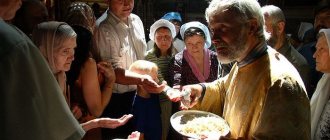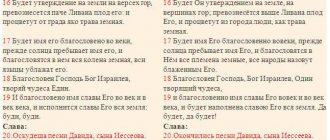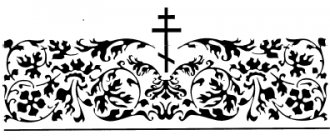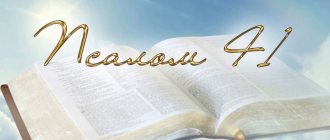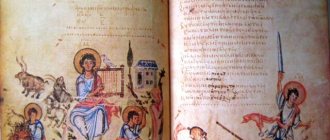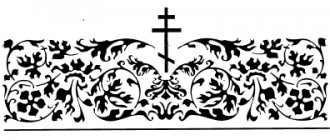Kathisma 11
Psalm 77
Teaching of Asaph. 1: Listen, my people, to my law; incline your ear to the words of my mouth. 2: I will open my mouth in a parable and utter divinations from ancient times. 3: What we have heard and known, and our fathers have told us, 4: We will not hide from their children, declaring to the coming generation the glory of the Lord, and His power, and His wonders which He has done. 5: He established a statute in Jacob and laid down a law in Israel, which commanded our fathers to proclaim it to their children, 6: that the coming generation might know the children who would be born, and that they might proclaim it in due time to their children - 7: to place their hope in God and not to forget the works of God, and to keep His commandments, 8: and not to be like their fathers, a stubborn and rebellious generation, unsettled in heart and unfaithful to God in their spirit. 9: The sons of Ephraim, armed, shooting with bows, turned back in the day of battle: 10: They did not keep the covenant of God and denied walking in His law; 11: They forgot His works and the wonders that He showed them. 12: He did wonders in the sight of their fathers in the land of Egypt, in the field of Zoan: 13: He divided the sea, and led them through it, and made the waters a wall; 14: And he led them by a cloud during the day, and by the light of fire all the night; 15: He cut the stone in the wilderness and gave them drink as from a great deep; 16: He brought forth streams from the rock, and the waters flowed down like rivers. 17: But they continued to sin against Him and provoke the Most High in the wilderness: 18: They tempted God in their hearts, demanding food for their souls, 19: The Lord heard and was kindled with anger, and fire kindled against Jacob, and wrath arose against Israel 20: Therefore that they did not believe in God and did not trust in His salvation. 21: He commanded the clouds from above, and opened the doors of heaven, 22: and he rained manna upon them for food, and gave them the bread of heaven. 23: The man ate the angel's bread; He sent them food until they were full. 24: He stirred up the east wind in the sky and brought down the south with His power 25: and He rained flesh upon them like dust, and feathered birds like the sand of the sea: 26: He cast them down in the midst of their camp, near their dwellings, - 27: and they they ate and were full; and we will give them what they want. 28: But their desire had not yet passed, food was still in their mouth, 29: the wrath of God came upon them, slew their fat ones, and cast down the young men of Israel. 30: Despite all this, they continued to sin and did not believe His miracles. 31: And he destroyed their days in vanity, and their years in confusion. 32: When He killed them, they sought Him and turned, and from early morning they fled to God, 33: and they remembered that God is their refuge, and God Most High is their Deliverer, 34: and they flattered Him with their lips and lied to Him with their tongues. before Him; 35: But their heart was not right with Him, and they were not faithful to His covenant. 36: But He, the Merciful, forgave sin and did not destroy them, turned away His anger many times and did not arouse all His wrath: 37: He remembered that they are flesh, a breath that goes away and does not return. 38: How many times did they provoke Him to anger in the desert and provoke Him to anger in the uninhabited country! 39: And again they tempted God and insulted the Holy One of Israel, 40: They did not remember His hand, the day when He delivered them from oppression, 41: When He did His signs in Egypt and His wonders in the field of Zoan; 42: And he turned their rivers and their streams into blood, so that they could not drink; 43: He sent insects against them to bite them, and toads to destroy them; 44: He gave the plants of the earth to the caterpillar and the laborers to the locust; 45: Their grapes were beaten with hail, and their sycamores with ice; 46: Their cattle were given over to hail, and their flocks to lightning; 47: He sent upon them the flame of His wrath, and indignation, and wrath, and disaster, an embassy of evil angels; 48: He made the path equal to His wrath; He did not guard their souls from death, but gave their cattle over to the plague; 49: He smote every firstborn in Egypt, the firstfruits of strength in the tents of Ham; 50: And he led his people like sheep, and led them like flocks through the wilderness; 51: He led them safely, and they were not afraid, but the sea covered their enemies; 52: And he brought them into his holy region, to this mountain, which his right hand had acquired; 53: He drove out the nations from before them, and divided their land as an inheritance for them, and settled the tribes of Israel in their tents. 54: But they still tempted and grieved the Most High God, and did not keep His statutes; 55: They retreated and changed, like their fathers, they turned back like a faithless bow; 56: They grieved Him with their high places, and aroused His jealousy with their graven images. 57: God heard and was inflamed with anger and was greatly indignant against Israel; 58: He cast aside the habitation of Shiloh, the tabernacle in which He dwelt among men; 59: And he delivered his strength into captivity and his glory into the hand of the enemy, 60: and he gave his people to the sword, and was angry at his inheritance. 61: Fire consumed his young men, and his maidens had no song of marriage; 62: His priests fell by the sword, and his widows did not weep. 63: But, as if from sleep, the Lord arose, like a giant overcome by wine, 64: and struck his enemies in the rear, consigning them to eternal shame; 65: And he rejected the tent of Joseph, and chose not the tribe of Ephraim, 66: But he chose the tribe of Judah, Mount Zion, which he loved. 67: And he built his sanctuary as the heavens, and established it as the earth forever, 68: and he chose David his servant, and took him from the sheepfolds 69: and from the milking men he brought him to feed his people Jacob, and his inheritance , Israel. 70: And he shepherded them in the purity of his heart and led them with wise hands.
Psalm 11
Caption: At the end, O oss, a psalm to David. Translation: At the end, about the eighth day, a psalm of David.
What real events gave rise to the writing of the psalm? According to the holy interpretive fathers, the relationship between David and Saul. The historical plan is unclear, as it is secondary: David runs from Saul and reflects on the evil that the lips of men have committed: with his lips Saul promised not to harm David, sometimes he sincerely blessed him, but then he wanted his death and prepared it. That's the whole story. But even such a modest historical reference allows us to make not the text of the psalm, but the interpretations of the fathers, who were unanimous in the interpretation of the historical moment. What is important is not history or historical subtext, but the completion of history in eternity. The prophetic, messianic, soteriological meanings of the psalm dominate history.
The main theme - salvation of man from his sins - rises above the history and private life of David. The Divine truth in the perception of people, having been refracted, fell apart into many private “truths,” human “truths” that are not the truth of God. These particular “truths” have incomparably diminished, lost the greatness of their source - this is the beginning of destruction, and its triumph lies in blasphemous, godless words, in slandering the truth of God. People have become vain, deceitful, and do evil, so their word has become vain, crafty, and evil. The sin of the world is focused in the word of man; the Wisdom of God is focused in the word of God. A person’s attitude to the word of God and to his own word is significant for his salvation: the theme of salvation is closely related to the theme of the word , and David shows this connection. The human word , in which lies, flattery, pride, malice, is contrasted with the Divine , true, saving word. Let us note that the evil human word is opposed not to the good human word, but to the Divine word. We live by it and do not have “our own” truth, different from the highest. There is also the word of the prophet David : it prays, prophesies in the Holy Spirit, leading us to high generalizations, it conveys the secret thoughts of the enemies of the Lord and the promises of the Lord Himself. The word of a prophet is God's word.
The prophet's gaze is fixed on the eternity of the eighth day and prophesies about it ( "O osmoy ") and about salvation ( "to the end ") . Zigaben connects the inscription “O Osmies” with the resurrection of Christ, writes that the psalm “prophesies the resurrection of Christ.” Indeed, at the basis of our eighth day, our resurrection, is the Cross, i.e. the earthly “end” of the Savior, and His resurrection: “For the Lord, having received the end of earthly life through death, rose again on the eighth day, i.e. on Sunday, which, since it begins the days, is called the first (among the Greeks); and since it follows the seventh, i.e. Saturday is called the eighth” (EZ). Moreover, the inscription is translated “for the eighth” (υπερ ογδοος) (* i.e. prayer for the eighth day): “for he does not teach what the eighth is, but asks God that this eighth day will come” (EZ). David asks: “ Save me, Lord,” and hears in spirit: “Today I will rise , says the Lord, I will rely on salvation, I will not complain about it.” When the Lord rises, having fulfilled all the prophecies, He will thereby stand for judgment over every soul, since each soul will have to be ready to respond to the Saving word of the Risen One with the deeds of life, which will determine its eighth day - eternity. This psalm is messianic and teaching : it teaches the path of salvation, denounces sin and reveals theological truths.
The psalm begins with David’s prayer for salvation: “Save me, O Lord...”. He prays (2 v.) to God and at the same time reasons why only the Lord can save him (2-3 v.). As an answer to prayer, he receives notification from the Holy Spirit, firstly, about God’s punishment for the verbal sin of the crafty and evil (4-5 vv.), and, secondly, about the rise of the God-man Christ for the saving work (6 vv.) and about His word (verse 7). For the sake of saving the beggar, the Lord stands up, wanting to save everyone. He promises that he will accomplish and complete the work of salvation. The Lord opposed the crafty words of people of “this kind” with His word, pure, precious, and wise. The Lord Himself and His word will protect the righteous from those who walk “around,” and they will not be allowed to attack the person whom God has likened to His height, deified, and glorified. What was revealed to David fully convinces him that the Lord will preserve the godly from the people of “this generation”: the wicked, the proud, those who consider themselves the master of the word (v. 8). To people, to the sons of men, the Lord will increase mercy according to His height: they will be inaccessible to the wicked who walk around (verse 9). This is the general meaning of Psalm 11.
Salvation begins with the prayer of the righteous: v. 2. Save me, Lord, for the venerable one has become impoverished: for the truth has fallen away from the sons of men . Translation: Save me, O Lord, for the number of the righteous has diminished, for the truth has become scarce among the sons of men. The prayer is short and fiery: “Save me, Lord!” . And then David explains from what or from whom he should be saved and why the Lord Alone can do this: “ for the venerable one has become impoverished: for the truth has fallen away from the sons of men .” “According to the translation from Hebrew, these words read like this: “Save me, Lord, for the righteous is no more, for there are none faithful among the sons of men”” (GR). Save me from a world in which evil triumphs. The meaning of the Slavic translation is more complex and deeper: save me You Yourself, Lord, because the saint has become impoverished, and his truth has diminished. It is this tragic meaning that, first of all, like thunder, shocks the reader - and this meaning is present only in the Slavic translation. This is how it seems to the righteous, as it seemed to the prophet Elijah, that he is the only one left among the faithful. However, a saint, if he is holy and God acts through him, cannot become poor without ceasing to be a saint; Truth can diminish even less: “Truth is that which is real. So, the truths have become distorted and darkened, not in the sense that they were damaged in their very essence, but in the sense that they were rejected by people; therefore, he not only said: “the truth has diminished,” but, wanting to express precisely this, he added: “among the sons of men”” (Zlat.). Zigaben suggests reading not “from the sons of men,” but “from the sons of men.”
It is this tragic meaning: the monk has become impoverished, and the truth has diminished, that attracts attention. How should we understand: “the monk is impoverished” ? 1. Those whom You wanted to see as venerable (those whom You chose especially or all people in general as called to holiness) became impoverished in righteousness, lost Your likeness; Your truth moved away from them, because it was perverted and belittled by them, because they stopped seeking and desiring it. Therefore, they are not my helpers in salvation - You save me.
2. Or: the race of saints has become impoverished, i.e. the number of the venerable, but the wicked are many. And I could become their next victim - save me!
3. Or: save me from poverty, and the truth of my mouth (the prophet speaks Divine truth) from vanity.
The race of those who were reverent to God has become impoverished; people have belittled the Divine truth, breaking it into many human “truths,” their own truths, which they treat as the truths of God. The truth seemed to diminish and move away. It is not often that you hear a saving, non-vain word; it is not often that you observe a humble, righteous life in accordance with the word. The good word and good life of the righteous is trampled upon by the evil word and evil deed of the wicked, and from this the humble man, impoverished for the sake of God, suffers.
David asks for salvation - from what or from whom? In the Slavic text, it comes to the fore: save me, Lord, from spiritual impoverishment and distance from Your truth, and my words from vanity, lies and all evil. Save me - help me preserve my likeness to You: help me preserve righteousness, piety, contemplation of the heights of Your truth. In Hebrew - save from the unrighteous and infidels.
No matter how we interpret these words, it is clear that they could have been spoken by the righteous Noah, the prophet Elijah, a contemporary of the Lord, and our contemporary. The world gives a reason to see the impoverishment of great meanings in the words and lives of people. Chrysostom suggests it is better to be surprised at the greatness of the spirit that was preserved by some people: “We are surprised at Abraham, Lot, Moses because they were like stars in the dead of night, roses among thorns, sheep among many wolves, they walked along the path opposite to everyone, and didn't stop. If this is difficult in a crowd, and when many go in the opposite direction, then one who goes against the crowd encounters numerous difficulties; if during navigation, when the waves rush in the opposite direction, it is difficult to direct the ship to meet them, then even more so in virtues. That is why this righteous man, who followed the path of virtue, while all others followed the opposite path, resorts to the providence of God and says: “Save me, Lord.” He expresses nothing more than the following: I need the highest right hand, heavenly help, divine assistance, because, following the path opposite to everyone else, I need great providence” (Zlat.). We should not focus on the sins of the sons of men, of which we are not judges, but we should look at high examples.
How did the moral impoverishment of man and what he considers the truth manifest itself? In what he says, and the most destructive things for himself, a person says in his heart: v. 3. Every one speaks vainly to his sincere: flattering lips in the heart, and evil words in the heart. Translation: Every one speaks vain things to his neighbor: evil words are in his heart, and from his heart he speaks evil. What indicates the moral illness of people? Not only sinners, but all the sons of men speak vainly, in vain: “ Vanity is the verb of each one to his sincere .” In relation to what is it vain? In relation to salvation. Words might seem and be (in the worldly sense) reasonable, scientifically based, but they became useless for the salvation of man and his eternity. These words circled around what was doomed, and were themselves doomed. But most importantly: they were not filled with eternal heavenly meanings, love, peace, desires for good, as the Lord would later reveal in His word. Since love had become scarce, no one had any heartfelt, kind, intelligent words, even for a friend, for a “sincere friend.” A word filled with true love, even if it is about something ordinary and transitory, is never vain. What is the cause of flattery, slander, condemnation and all other sins of the tongue? The root of these sins is “ in the heart” ; in it is the source of that good or that evil that words bring forth. The heart spoke deceitfully, it had deceitful lips and brought out its evil into the world: “ Deceitful lips are in the heart, and evil words are in the heart .” Emptiness, vanity of words is (of course, to varying degrees) a common disease for good and evil: we are all empty talkers. The fall begins with her. Vanity is followed in descending order: lies as inaccuracy, as delusion, and lies as an active, destructive crime. So: vanity (“vain”), lies, deception (“flattering lips”), evil (“evil”) - this is a gradation towards the intensification of evil.
Sin is always followed by God's judgment. The Holy Spirit reveals to the prophet David the future of the wicked and the future of the righteous. He makes this future dependent on man's own word and on his relationship to the word of God: v. 4-5. The Lord will consume all flattering lips, a loquacious tongue, the remark: Let us magnify our tongue, our lips are with us: who is the Lord to us? Translation: The Lord will destroy the wicked lips, the arrogant tongue of those who say: “Let us exalt ourselves with our tongue; we have mastery over our lips. What is the Lord to us! “ The Lord will consume all flattering lips and lofty tongues .” There is a metonymic transfer here: the enemy is not the mouth, but the evil and proud spirit - the Lord will consume his evil. Chrysostom warns: we must understand the words “ the Lord will consume ” not in the sense that He will kill the evil ones: “This was not said against them, but for them. He did not say that they would perish, but that evil would be destroyed; He did not say: the Lord will consume them, but: “flattering lips”” (Zlat.). Another opinion: “In the words of this verse, the prophet announces the destruction of flatterers and slanderers, claiming that the Lord will destroy those people who say: “We are strong with our tongue, our lips are with us, who is our master?”” (GR).
“ Large tongue ” belongs to a deceiver who relies on verbosity and plays with concepts. This tongue is driven by a crafty, proud, resourceful mind that serves the flesh and the father of lies. The latter helps him look for arguments for self-justification and deception. The truth does not need eloquence; a lie needs it, like a beautiful wrapper. We observe the sinful exaltation of language, for example, when a word poetizes sin, when a game of concepts calls black something white, when behind a beautiful word there is no good deed, and the word becomes its replacement, a screen for emptiness, when the main thing is not what to do, but what to say. The Lord will consume all evil, including the evil of the tongue.
And then David “voices out” the innermost thoughts of sinners, which reflect the destruction of pride: “Let us magnify our tongue, our lips are our essence: who is our Lord? " If a person is his own god, then he places his own word above the word of God. Prot. Gregory wrote about this rhetorical question: “This is said by wicked people who rely on their insolent tongue (a loquacious tongue) and think to rule over others through slander and slander - and at the same time they dare to declare: we will be stronger than everyone else with our tongue, whoever hinders us , who is our master? Such were the flatterers at the court of King Saul in the time of David (1 Samuel 23:20); such was the Pharaoh of Egypt, who said to Moses and Aaron: “Who is the Lord, that I should obey His voice?” (Ex. 5.2). Such was Rabshakeh, the military commander of the king of Assyria (2 Kings 18:28-32); such was Nebuchadnezzar, king of Babylon (Dan. 3:15). Such were the enemies of our Lord Jesus Christ, who, during His suffering on the cross, were not afraid to spew out their blasphemies and said: “...he saved others, but he cannot save himself! If He is the King of Israel, let him now come down from the cross... He trusted in God: let him now deliver Him, if He pleases Him” (Matthew 2742-43). The Lord will consume such wicked people, with their lofty tongues, punish them, and destroy them” (GR). Sacred history contains many examples of how God rewarded the word of the proud, evil and evil. A person’s speech focuses his evil in itself: the wickedness of the Jews poured out in their cry - “Crucify Him.” The Word carries a spirit, and this spirit will be judged by God.
David begins his denunciation with a common sin - idle talk ("vain words every one to his sincere") - and ends it with a word about the sin of blasphemy, which leads to spiritual death. In the words: “Who is the Lord to us?” - pride and satanic contempt for God. The thought behind this question is: we have our mind and mouth, which can explain and justify all our whims and actions, and God is not our Lord. Chrysostom objects to such people: “These lips, he says, belong not to you, but to the Lord: He created them, He arranged them, He breathed life into them. But do you own them? Not everything that we own is ours.” Our lips belong to God, if we give them, along with our entire life, to Him, then He enters a person and speaks through his lips. If a person believes that life and lips belong only to him, then our lips are not “ with us ,” but against us. When the lips justify every sin and crime, they make our evil unrepentant and eternal. “Who is the Lord to us?” “These are words of madness, frenzy, mental corruption; hence comes countless evils” (Zlat.).
St. Athanasius considered the images of Ps. 11. only in connection with the life and teachings of the Savior. People who blasphemously ask “Who is the Lord to us?” are the crafty and hard-hearted scribes, the Pharisees, whom the Lord called in the same way as David in this psalm, “this generation” (v. 8), or their prototypes. David represents the Lord. St. Athanasius wrote: “Here David prays for deliverance from the evil generation. This generation was under our Savior Jesus Christ; It was about him that the Savior Himself said: the men of Nineveh will arise and condemn this generation (Matthew 12:41).” When the Truth was embodied, when She appeared not in a diminished, fragmented form, but in all its integrity, strength and greatness, then the lie used all the weapons against It, all the powers of the mind that it had - it showed its maximum lethality. Then the destruction of verbal sin was completely revealed. Its destruction lies in the fact that lies and every sin that the word carries kills, destroys its bearer and brings sorrow to the righteous. But it is not the business of the righteous to try to outwit lies. A righteous person must respond to a lie with the truth, otherwise he will cease to be righteous. Only the All-Cunning Word will outwit the father of lies and lies itself: He will allow Himself to be killed and destroy death in Himself. In His words He will be extremely truthful and precise with His enemies.
From 5 tbsp. We learned that the Lord will consume proud and flattering lips from 6 . We will find out what the Lord will do for the poor and needy. For the sake of the prayerful sighs of the humble and in view of their suffering, He will become incarnate, lie on the Cross, rise again, and save His servants. Art. 6. Passion for the sake of the poor and the sighing of the needy will now rise again, says the Lord: I will rely on salvation, I will not complain about it. Translation: “ For the suffering of the poor and the sighing of the needy, I will now rise,” says the Lord, “I will bring about their salvation and will not retreat!” " Passion for the sake of the poor and the sighing of the poor ." For the sake of the humble - the poor and wretched - the Lord incarnates, ascends to the Cross and in burial reveals the limit of His humility: the God-man not only died, but was also buried - was laid in the tomb cave for our salvation: the Lord saves the poor and wretched, i.e. humble, contrite in spirit, living in faith and hope, not considering anything theirs. He is with them, and this is their strength: “Look what the power of humility is. The power of the poor—and by poor I mean the brokenhearted—is God’s intercession for their suffering. The Prophet does not speak here about their life, about virtues, but their suffering, he says, bows to God and encourages them to punish and take revenge. This is what it means to endure insults courageously; This is how God cares for those who are unjustly offended! Misfortune and suffering serve as their greatest protection. Great is the power of sighing: it calls for higher help. Be afraid, you who wrong the poor. You have power, wealth, money, the favor of judges; but they have weapons that are stronger than anything else - sighs, tears and patience with insults, which is how they attract heavenly help. These weapons destroyed houses, overthrew foundations, destroyed cities, drowned entire nations: I mean the sighs of the unjustly offended. God Himself looks upon their complacency when, experiencing suffering, they do not utter a single bad word, but only sigh and mourn their own misfortunes” (Zlat.).
“ Today I will rise, says the Lord: I will rely on salvation, I will not complain about it .” “Having first remembered the resurrection of Christ, David later in these words remembers His burial, changing the order and returning back to Christ’s death on the cross” (EZ). “ I will rely on salvation ”: in these words Zigaben sees the image of both burial and suffering on the cross (the Lord lies down on the Cross). Both of these actions are included in the saving chain of Christ’s deeds: “... The Lord also speaks this: I will rely, that is, I will be nailed to the Cross, for He calls it here salvation. For the Lord, having defeated the tormentor-the devil with the copy and wood of the Cross, granted us salvation and complete freedom from our error, and those who were previously weak He strengthened us against the demons. I’ll show myself, he says, clearly on it; those. I will declare to the whole world on the Cross the Divine power hidden within Me. For when the Lord hung on the Cross, the veil of the temple was torn, the sun was darkened, the earth shook, the stones disintegrated, and other miracles happened” (EZ). The miracles and signs that accompanied the death and resurrection of the Savior, together with the subsequent burial and ascension, will complete the fulfillment of the Old Testament prophecies about Christ the Redeemer. Whoever wants to, will see that the Messiah has come, and through faith in the Risen One can achieve salvation.
The Lord Himself assures that he will not deviate, will not waver in the matter of salvation: “I will not be offended about it” : “Boldly, openly and clearly, he says, I will defend them, so that everyone will know. But does He ever save in a way that is not obvious? Sometimes not openly, but secretly, because He does not need human glory. Now, when their enemies obviously attacked them, insulted and dishonored them, as if they did not have God as their helper, so that the enemies themselves would come to their senses and become better, having learned from experience the help of the Lord, I will arrange, he says, save them clearly" ( Zlat.).
Immediately after the promise of salvation, David speaks of the instrument of salvation. This is not only the Cross, but also the word of God the Word. The Lord will demonstrate salvation both by the work of redemption and by His word, and the words of the Lord are pure and like molten silver: v. 7. The word of the Lord is pure, silver is kindled, tempted by the earth, purified by the sevenfold. Translation: The words of the Lord are pure words, silver refined, tested in the furnace, purified seven times. The Word of God is contrasted with the worldly, vain word (verses 1-5). Sinners magnified their own evil word, behind which satanic opposition to God, and the prophet magnified the word and will of the Lord. “According to the translation from the Hebrew, these words read like this: “The words of the Lord are pure words, silver purified from the earth in a smelter (or crucible), refined seven times”” (GR). Chrysostom connected the revelation of the word of the Lord with the threat that the Holy Spirit conveyed through David to a flattering mouth and a lofty tongue: “What is the consistency between these words and the above? Great and direct. Do not think, he says, that this was said in vain, that this threat is in vain: His words are pure, free from lies. Just as molten silver has nothing alien or unclean, so the words of God, no matter what He says, must certainly be fulfilled.” “So much,” he says, “the words of God are pure and not mixed with deception and lies, that they are like silver, poured over and cleansed of rust and earth. He said what was learned through the earth instead of what was tested in the earth, as Chrysostom explains; because gold-melting artists pour silver into the earth and earthen smelters. Or, having been found out through the earth, he replaced it with what was cleared from the earth” (EZ).
The words of the Lord are purified from all human imperfection, from everything vain and transitory. Even when the Lord does not set forth His teaching, does not instruct, but asks about transient, earthly things or Himself speaks about them, and then His questions and words serve for the salvation of man, they breathe Divine love, therefore, they are not vain, and, apart from Moreover, they usually hide a significant spiritual meaning. To prove this, let us consider the most famous example, when the Lord appears to the disciples after the resurrection on the shore of the Sea of Tiberias: And when morning had already come, Jesus stood on the shore; but the disciples did not know that it was Jesus. Jesus says to them: children! do you have any food? They answered Him: no. He said to them: cast the net on the right side of the boat, and catch it . They cast and could no longer pull out the nets from the multitude of fish. Then the disciple whom Jesus loved said to Peter, “This is the Lord.” Simon Peter, hearing that it was the Lord, girded himself with clothing (for he was naked) and threw himself into the sea. And the other disciples arrived in a boat (for they were not far from the land, about two hundred cubits), dragging a net with fish. When they came to the ground, they saw a fire laid out and fish and bread lying on it. Jesus says to them: Bring the fish that you have now caught. Simon Peter went and brought down to the ground a net filled with large fish, of which there were one hundred and fifty-three; and with such a multitude the network did not break through. Jesus says to them: Come, have dinner. None of the disciples dared to ask Him: Who are you? knowing that it is the Lord. Jesus comes, takes the bread and gives them fish as well. This was the third time Jesus appeared to His disciples after His resurrection from the dead ” (John 21:1-14).
The Lord is on the shore, and the disciples are at sea. He is already at the long-awaited pier - with the Father, and they, whom He is waiting for on the shore, will in due time come to the shore and draw their catch to the shore - the souls of those saved by Christ (these are the thoughts of St. Gregory the Dvoeslov). Without Him, the nets will be empty, because the disciples are not the true fishers - they are participants in His work. He is the Chief Doer.
Why did the Theologian recognize the Lord and Teacher? The teacher did not expound the teaching, but was recognized, although he spoke about ordinary, transitory things - about food and fish. But through them He created the deepest sign, revealed Himself as God, Wisdom and Love. The address “children,” pronounced with genuine fatherly love, with His love, even then, apparently, revealed to John the Speaker, and he recognized the Lord. The man recognized the voice of Heavenly Father because God called him. Not everyone found out, but the one who had great purity of heart, who was faithful to the end. The Lord asked the disciples whether they had food, not because he did not know, but in order to create another sign: to answer the need of man, to have a reason to reveal Himself as the Giver of every necessary good (He, like the Father, gives daily bread). This is characteristic of the Lord: to ask a person about his property (“do you have any food”) not in order to take or buy, but to give - in abundance. He commands - and the Theologian feels that this is a Divine command - to cast the net on the right side - and catch. They cast and cannot pull out the catch. This catch is the work of the Teacher’s love for the hungry disciples, a sign of their future service and the revelation of Himself as God, the Helper, and the Giver of all good. And then the Theologian shares his guess with Peter. Next, the Lord orders to bring all the fish caught - so that the miracle is clear to everyone and reveals its Creator.
Another link in the sign event: the Lord stands on the shore, and He has everything necessary: fire to keep warm, bread and fish to satisfy hunger. Where did the fire, the baked fish, the bread come from? “The coals, fish and bread that the disciples now see also constitute a miracle. For He fed so many people with them - not from a ready-made substance, as before in the desert with five loaves of bread (John 6:9-12) and two fish - but simply, from nothing. When the Lord said: “Come and have dinner,” no one asks or dares to ask” (Theophylact). Again He reveals Divinity, Omniscience and Love. And most importantly: “The Almighty Lord appears again as the Servant. He has already prepared a meal, the fire is lit, and there is fish and bread on it. God’s table awaits the disciples” (Vladimir Popov). The events are real, but not ordinary: the disciples already clearly feel the height of spiritual reality, which is visible through these events. They see God Acting. They do not dare to come up and take the fish and bread themselves, so “Jesus comes and takes the bread and gives them the fish also.”
So, even if the Lord speaks about fish and food, then His word is cleansed of worldly, carnal meanings, it is filled with love and shows the way to salvation. It is not the subject of speech that makes a word Divine, but the Spirit that stands behind the words. The Word of the Lord, as if by fire, was purified by His Divinity, tested by His mind.
Art. 8. You, Lord, have preserved us and kept us from this generation and forever. Translation: You, Lord, will preserve us and keep us both in our days and forever. David solemnly professes faith in salvation: the Lord Himself will save and preserve us, the broken-hearted (the poor and wretched), from people “of this kind”: the evil ones, rich in themselves, proud, those who oppose God and the living Truth of Christ. More precisely: “...You will save us from the snares of this kind, from these insidious and flattering people, or, what is the same, from moral influence, from infection from the people of this corrupt age. And not only now, in this life, but also in the future endless life and forever, protect and save us, granting eternal peace to all those who trust in You” (GR). “This word was justified, for the faith of those who accepted the preaching of the Gospel remained undefeated by the generation of persecutors of that time and will remain invincible forever: and neither the Greeks who were openly hostile to the faith, nor the heretics who secretly contrived against it could defeat it and will not defeat it until the end of the age” ( EZ). You will save us - not from persecution, malice, martyrdom, but from so that people of “this kind” do not steal our treasure given by God: truth, faith, humility and love for God.
Art. 9. Around wickedness walk: according to Your height You have multiplied the sons of men. Translation: The wicked are walking around us. According to Your greatness, You have increased mercy to the sons of men. " Wickedness walks around ." “Okrest means “around, here and there, from everywhere” - hence the word: neighborhood, i.e. surrounding area" (GR). The wicked and heretics walk around the righteous man and the truth that he professes, but they cannot destroy the righteous man and acquire the truth or damage the truth. Another explanation: “Some teachers perfectly explain this passage like this: every virtue is in the middle, just as the focus is in the middle of the circle. On either side of virtue there are two evils—excess and deficiency. For example, prudence is in the middle; but on one side there is cunning, and on the other there is foolishness, as if surrounded by it. So the pious and righteous walk and find themselves in the same middle, but wicked sinners, not finding the middle, walk around in circles, i.e. in the excesses and shortcomings of virtue, otherwise they walk in evil” (EZ).
“ Thou hast multiplied according to Thy height the sons of men .” If the wicked walk around the righteous, where does the righteous walk? - According to Your height, Lord. Adam walked upon Your height, but fell and became impoverished; The second Adam will bring to great heights those sons of men who, taking up their cross, will follow Him. Chrysostom explains these words of the prophet as a contemplation of the deification that the monk will achieve: “What does it mean: “according to Your height”? Otherwise, to say: You have made them as similar to You as it is possible for a person to be like You. “Let us make man,” said the Lord, “in our image and likeness” (Gen. 1:26). As He is in heaven, so are we on earth; and just as in heaven there is no one higher than Him, so on earth there is no being equal in dignity to man. “Be ye perfect, even as your Father in heaven is perfect” (Matthew 5:48). He even told us his name: “I said: you are gods and you are all sons of the Most High” (Ps. 82:6); and again: “I have made you a god to Pharaoh” (Ex. 7:1). He even made man the creator of the corporeal and the incorporeal. So Moses transformed one element, and others - other elements; He commanded us to build ourselves into His temple. Although you do not build heaven, you build a temple for God. And heaven itself is glorious because God dwells in it; much more are we through Christ; “And he raised up with Him,” says the apostle, “and made him sit in the heavens” (Eph. 2:6). He gave us the power to do more than He Himself did: the signs, He says, “which I do, he will do also, and greater than these will he do” (John 14:12). And in the Old Testament one changed the course of the sea (Exodus 14:21), another held back the sun and commanded the moon to stop (Joshua 10:13), the third returned the sun's rays (2 Kings 20:11); the youths in the furnace held back the power of the fiery element, and the raging flame was inactive and groaned as if bound (Dan. 3:23); and the animals knew how to honor the friends of God, and, despite the hunger that tormented them, they remained prudent (Dan. 6:22) ... And is it surprising that they themselves were revered when their clothes and shadows were terrible for demons, death and illness (Acts .5:15; 19:12)? Even the angels respected such people and showed them special honor (Gen. 18:5;19:3). And how could they not respect those whom the Lord himself honored? This happened in both the Old and New Testaments. That is why the prophet says: “According to Your height, You have increased your care for the sons of men.” Therefore, imagining the greatness of this honor, let us reward Him for it in a worthy manner, so that the advantage of honor does not serve as a reason for us to punishment, from which may we all be spared, both those who teach it and those who are discipled, in Christ Jesus our Lord, to whom all things are due. glory, honor and worship forever and ever. Amen" (Zlat.).
Literature
Sources:
Psalter. Slavic translation from Greek. Russian translation from Greek . - Ed. Verotsky V.D., Kustovsky E.S., Serdyuk V.M.: “Pilgrim”, 2000.
Psalter with parallel translation into Russian . – M.: Orthodox St. Tikhon’s Humanitarian University, 2005.
Interpretations:
Athanasius the Great, St. Commentaries on the Psalms . – St. Athanasius the Great. Creations in 4 volumes, M., 1994 – abbreviated as AB.
Gregory Dvoeslov, St. Conversations on the Gospels: In 2 books. – M.: Publishing house of the Moscow Compound of the Holy Trinity Sergius Lavra, 2009.
Gregory of Nyssa, St. On the inscription of psalms. https://www.golden-ship.ru/knigi/1/grigoriy_nisskiy_oNP.htm - GN.
Grigory Razumovsky, prot. Explanation of the Holy Book of Psalms . – M.: Orthodox St. Tikhon’s Humanitarian University; 2010 – GR.
Zigaben Evfimiy. Explanatory Psalter. M., 2002 – EZ.
John Chrysostom, St. Conversations on the Psalms . - M.: Orthodox St. Tikhon's Theological Institute, 2003 - Zlat.
Irenaeus (Horde), bishop. A guide to understanding the Psalms. — M.: “Lestvitsa”; St. Petersburg: North-Western Center for Orthodox Literature “Dioptra”, 2000. (According to the 1882 edition); https://www.pravbeseda.ru/library/index.php?page=book&id=856 – IO.
Theodoret of Cyrus, bl. Psalter with explanation of the meaning of each verse . M., 1997 – FC.
Tutorials:
Klimenko L.P. Dictionary of figurative, figurative and symbolic uses of words in the Psalter . – Nizhny Novgorod: “Christian Library”, 2012 – SK.
Church Slavonic Dictionary of Rev. A. Svirelina . – Publishing house: “Grad Kitezh”, 1991 – SS.
Abbreviations:
St. Athanasius - St. Athanasius the Great, Archbishop of Alexandria.
St. Basil - St. Basil the Great, Archbishop of Caesarea in Cappadocia.
St. Gregory - Saint Gregory of Nyssa
Prot. Grigory - Archpriest Grigory Razumovsky.
Chrysostom - St. John Chrysostom, Archbishop of Constantinople.
Zigaben – Evfimy Zigaben
Ep. Irenaeus – Bishop Irenaeus (Horde).
Blazh. Theodoret - Blessed Theodoret of Cyrus (or: Cyrrhus).
.
Note
We comment, as a rule, only on the Slavic text , and not on the Russian translation. The latter is given for the sake of convenience in understanding the Church Slavonic language. If there is a need to further highlight any idea in the quoted text of the interpretation, we will underline it with one line . Our comments and explanations that interrupt the quotation will be enclosed in parentheses with an asterisk (*) .
What is kathisma
Kathisma, which means “seated” in Greek, is part of the book of Psalms. As can be seen from the translation, one can sit down while reading these texts, unlike most other prayers. At the same time, initially in the Byzantine tradition it was not customary to sit during kathisma, but sat after reading them.
Kathisma - liturgical part of the Psalter
The entire book of Psalms is divided into kathisma, as well as into its component parts. There are about twenty of them in total, and the length of all kafizas is approximately the same, although they may contain a different number of psalms.
Interesting! The largest number of psalms is contained in 118 kathisma. There are 15 in total, from 119 to 133 psalms.
At the same time, kathisma itself also has component elements: they are called “glory” or “statues”. The concept of glory comes from the text “Glory to the Father, and to the Son, and to the Holy Spirit...” which is read after each of these components.
How kathismas are read in church
The Psalter is read in the temple, so all 20 kathismas are read weekly. They are read during both evening and morning activities. Reading usually takes place in turns, but there are adjustments for special days.
During the service, readers recite kathisma and sing in chorus. The reader begins with the words “Glory to the Father and the Son...”, and the choir sings the next part. It is convenient to see how kathismas are divided in the table:
| Kathisma | 1 Glory | 2 Fame | 3 Glory |
| IN | 1-3 | 4-6 | 7-8 |
| II | 9-10 | 11-13 | 14–16 |
| III | 17 | 18-20 | 21–23 |
| IV | 24–26 | 27–29 | 30–31 |
| IN | 32-33 | 34-35 | 36 |
| YOU | 37–39 | 40-42 | 43-45 |
| Vii | 46–48 | 49-50 | 51-54 |
| VIII | 55-57 | 58-60 | 61-63 |
| IX | 64-66 | 67 | 68–69 |
| X | 70-71 | 72-73 | 74-76 |
| XI | 77 | 78-80 | 81-84 |
| XII | 85-87 | 88 | 89-90 |
| XIII | 91-93 | 94-96 | 97-100 |
| XIV | 101-102 | 103 | 104 |
| XV | 105 | 106 | 107-108 |
| XVI | 109-111 | 112-114 | 115-117 |
| XVII | 118: 1-72 | 118: 73-131 | 118: 132-176 |
| XVIII | 119-123 | 124–128 | 129–133 |
| XIX | 134–136 | 137-139 | 140-142 |
| XX | 143–144 | 145-147 | 148–150 |
Important! Psalm 151, which is included in the Bible, is also included in Kathisma 20. At the same time, this psalm is not used in worship services.
It is also worth noting that during Lent the order of reading the Psalter changes significantly. The main difference is that at this time all twenty kathismas are read twice a week.
During the service, the Psalter is read in its entirety over the course of a week.
In addition to reading at Vespers and Matins, as on other days of the liturgical year, kathisma is also read during the hours, when all the main psalms have already been read. The table also shows the Lenten reading program (except for the fifth week:
| Day | Vespers | Morning | 1 hour | 3 hours | 6 hours | 9 o'clock |
| Sun | 1 | 2, 3 | — | — | — | — |
| Mon | — | 4, 5, 6 | — | 7 | eight | nine |
| W | 18 | 10, 11, 12 | 13 | 14 | 15 | 16 |
| We'd | 18 | 19, 20, 1 | 2 | 3 | 4 | 5 |
| N.S. | 18 | 6, 7, 8 | nine | 10 | eleven | 12 |
| Fri | 18 | 13, 14, 15 | — | 19 | winds | — |
| Saturday | 18 | 16, 17 | — | — | — | — |
The fifth week of the Holy Forty Days is different in that it is during this week that the Great Penitential Canon of St. Andrew of Crete can be read in full. Its reading falls on Thursday, so on this day only one kathisma is read in the morning.
Holy Week is different in that the Psalter is read once, from Monday to Friday, after which the Psalter is not read. He should not read kathisma at all during the bright week.
Is it possible to read the Psalter at home?
Many Orthodox Christians also practice reading the Psalter at home, in personal prayer at home. For example, there is a pious tradition when such a prayer is performed instead of attending a church service if it was not possible to get there for some objective reason.
You can read kathismas as a prayer rule
You can recite a separate kathisma or even psalms, including them as part of your daily prayer routine. Before starting such prayer work, it is advisable to obtain the blessing of a priest.
For home reading, many great Orthodox prayer books have a convenient reading of the Psalter, which is divided into kathisma and contains additional prayers for repentance and petition.
